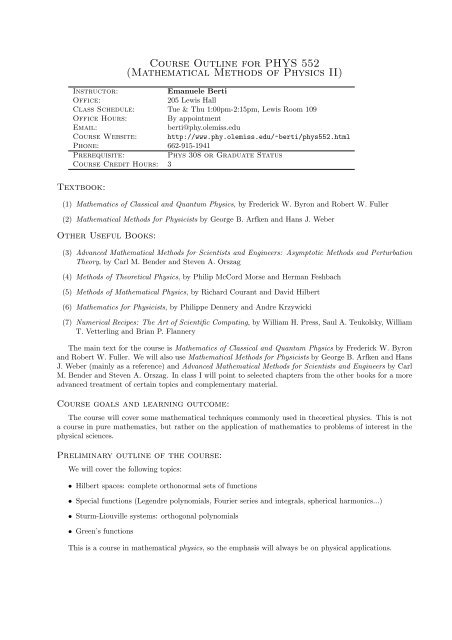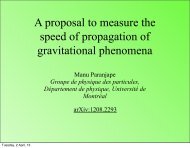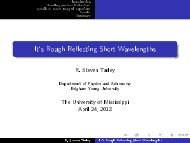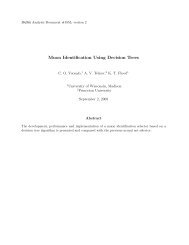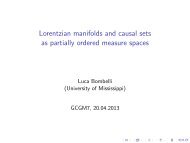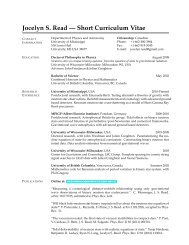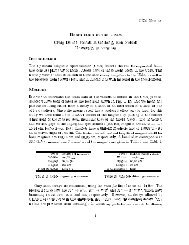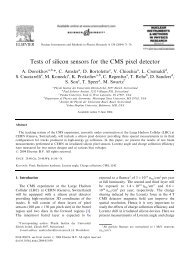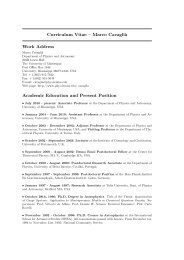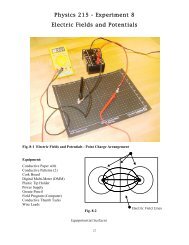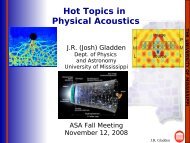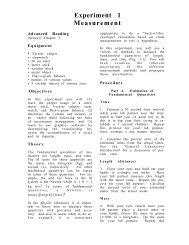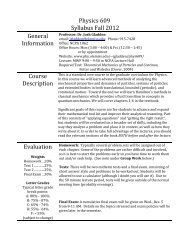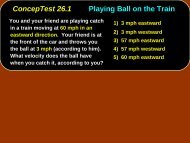Course Outline for PHYS 552 (Mathematical Methods of Physics II)
Course Outline for PHYS 552 (Mathematical Methods of Physics II)
Course Outline for PHYS 552 (Mathematical Methods of Physics II)
Create successful ePaper yourself
Turn your PDF publications into a flip-book with our unique Google optimized e-Paper software.
<strong>Course</strong> <strong>Outline</strong> <strong>for</strong> <strong>PHYS</strong> <strong>552</strong><br />
(<strong>Mathematical</strong> <strong>Methods</strong> <strong>of</strong> <strong>Physics</strong> <strong>II</strong>)<br />
Instructor: Emanuele Berti<br />
Office: 205 Lewis Hall<br />
Class Schedule: Tue & Thu 1:00pm-2:15pm, Lewis Room 109<br />
Office Hours: By appointment<br />
Email: berti@phy.olemiss.edu<br />
<strong>Course</strong> Website: http://www.phy.olemiss.edu/~berti/phys<strong>552</strong>.html<br />
Phone: 662-915-1941<br />
Prerequisite: Phys 308 or Graduate Status<br />
<strong>Course</strong> Credit Hours: 3<br />
Textbook:<br />
(1) Mathematics <strong>of</strong> Classical and Quantum <strong>Physics</strong>, by Frederick W. Byron and Robert W. Fuller<br />
(2) <strong>Mathematical</strong> <strong>Methods</strong> <strong>for</strong> Physicists by George B. Arfken and Hans J. Weber<br />
Other Useful Books:<br />
(3) Advanced <strong>Mathematical</strong> <strong>Methods</strong> <strong>for</strong> Scientists and Engineers: Asymptotic <strong>Methods</strong> and Perturbation<br />
Theory, by Carl M. Bender and Steven A. Orszag<br />
(4) <strong>Methods</strong> <strong>of</strong> Theoretical <strong>Physics</strong>, by Philip McCord Morse and Herman Feshbach<br />
(5) <strong>Methods</strong> <strong>of</strong> <strong>Mathematical</strong> <strong>Physics</strong>, by Richard Courant and David Hilbert<br />
(6) Mathematics <strong>for</strong> Physicists, by Philippe Dennery and Andre Krzywicki<br />
(7) Numerical Recipes: The Art <strong>of</strong> Scientific Computing, by William H. Press, Saul A. Teukolsky, William<br />
T. Vetterling and Brian P. Flannery<br />
The main text <strong>for</strong> the course is Mathematics <strong>of</strong> Classical and Quantum <strong>Physics</strong> by Frederick W. Byron<br />
and Robert W. Fuller. We will also use <strong>Mathematical</strong> <strong>Methods</strong> <strong>for</strong> Physicists by George B. Arfken and Hans<br />
J. Weber (mainly as a reference) and Advanced <strong>Mathematical</strong> <strong>Methods</strong> <strong>for</strong> Scientists and Engineers by Carl<br />
M. Bender and Steven A. Orszag. In class I will point to selected chapters from the other books <strong>for</strong> a more<br />
advanced treatment <strong>of</strong> certain topics and complementary material.<br />
<strong>Course</strong> goals and learning outcome:<br />
The course will cover some mathematical techniques commonly used in theoretical physics. This is not<br />
a course in pure mathematics, but rather on the application <strong>of</strong> mathematics to problems <strong>of</strong> interest in the<br />
physical sciences.<br />
Preliminary outline <strong>of</strong> the course:<br />
We will cover the following topics:<br />
• Hilbert spaces: complete orthonormal sets <strong>of</strong> functions<br />
• Special functions (Legendre polynomials, Fourier series and integrals, spherical harmonics...)<br />
• Sturm-Liouville systems: orthogonal polynomials<br />
• Green’s functions<br />
This is a course in mathematical physics, so the emphasis will always be on physical applications.
Evaluation:<br />
Grade Type:<br />
Grade Ranges:<br />
Whole Letter Grade (A–F)<br />
• A: 88% and up<br />
• B: 75-87%<br />
• C: 60-74%<br />
• D: 40-59%<br />
• F: less than 40%<br />
Grade Percentage: 60% Homework<br />
10% Mid-term<br />
30% Final exam<br />
Homework, in-class tests and final exam:<br />
Homework assignments will be announced in class, and they must be turned in at the beginning<br />
<strong>of</strong> class on the due date. Late homework will not be accepted. In exceptional cases students may<br />
be excused from turning in an assignment. Homework must be easy to read: please write down clearly your<br />
name and the problem set number, do not use a red pen, write consistently on either one side or both sides<br />
<strong>of</strong> the paper and staple the pages together. The final exam is open-book and will consist <strong>of</strong> problems to be<br />
worked out. Students will be allowed to use a calculator, and may be provided with an equation sheet by<br />
the instructor if necessary.<br />
Attendance:<br />
There is no strict attendance requirement, but you are strongly advised to attend class. If you miss an<br />
exam or cannot turn in homework, please in<strong>for</strong>m me be<strong>for</strong>ehand and get a doctor’s note if applicable.<br />
Academic Integrity:<br />
Violations <strong>of</strong> the University’s policy <strong>of</strong> academic integrity will result in a failing grade and other disciplinary<br />
actions.<br />
Note:<br />
If a change in the syllabus becomes necessary during the semester, it will be discussed in class and then<br />
posted on the course website. The course website will also contain up-to-date in<strong>for</strong>mation on the class<br />
schedule, homework assignments and complementary material.


